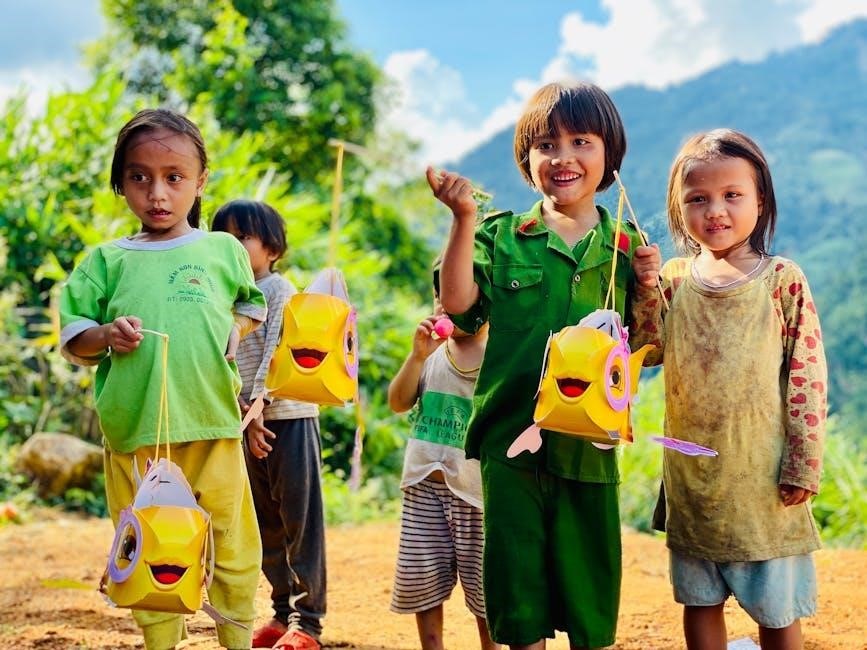Childhood friendships are a cornerstone of emotional and social development, fostering trust, empathy, and collaboration. These early relationships provide emotional support, a sense of belonging, and cherished memories. Nostalgia often enhances these bonds, creating a strong sense of continuity. Childhood friends play a vital role in shaping self-esteem, resilience, and lifelong personal growth.
1.1. The Role of Friendship in Shaping Early Life Experiences
Friendships play a pivotal role in shaping early life experiences by fostering emotional growth, social learning, and resilience. Through interactions with peers, children develop essential skills like cooperation, conflict resolution, and empathy. These relationships provide a sense of belonging and security, which are crucial for building self-confidence. Shared experiences and memories with childhood friends create a foundation for understanding relationships and navigating future social interactions. Friendships in early life also influence emotional intelligence, helping children recognize and manage their feelings. These formative connections lay the groundwork for healthy interpersonal dynamics and lifelong personal development, making them indispensable to a child’s overall well-being and maturity.
1.2. The Difference Between Friendship and Popularity in Childhood
Friendship and popularity in childhood are distinct concepts, often confused but fundamentally different. Friendship is rooted in mutual trust, emotional connection, and shared experiences, fostering deep, meaningful relationships. Popularity, however, revolves around social status, acceptance by peers, and being well-known within a group. While friendships focus on quality, popularity often emphasizes quantity, with children seeking to fit in or gain approval from others. True friendships provide emotional support and a sense of belonging, whereas popularity may not guarantee genuine connections. Understanding this distinction helps parents and children prioritize meaningful relationships over fleeting social acceptance, promoting healthier social and emotional development in the long term.

The Formation of Meaningful Childhood Friendships
Meaningful childhood friendships often begin around ages 4-5, rooted in trust, cooperation, and shared experiences. Playful interactions and emotional connections lay the foundation for lasting bonds and mutual understanding.
2;1. The Age When True Friendships Begin to Form
True friendships typically begin to form in children around the ages of 4 to 5, during pre-kindergarten or early school years. At this stage, children develop the emotional and social skills needed to understand and reciprocate trust, cooperation, and empathy. These early bonds are often rooted in shared experiences, such as playground interactions or classroom activities, which foster mutual understanding. Experts suggest that before this age, relationships are more about playmates than deep connections. As children grow older, these friendships evolve, laying the groundwork for lifelong social skills and emotional intelligence. This period is crucial for learning how to navigate relationships effectively.
2.2; Key Characteristics of Healthy Childhood Friendships
Healthy childhood friendships are built on trust, emotional support, and mutual respect. They foster empathy, encouraging children to understand and share each other’s feelings. Clear communication and honesty are essential, allowing conflicts to be resolved constructively. Shared activities and interests often strengthen these bonds, creating a sense of camaraderie. Loyalty and reliability are also crucial, providing a sense of security and dependability. These friendships promote positive social behaviors, helping children develop essential life skills like cooperation and conflict resolution. Healthy friendships also encourage individuality, allowing each child to grow while maintaining a supportive connection. Such relationships lay the foundation for strong, enduring social skills and emotional well-being.

Benefits of Maintaining Childhood Friendships
Maintaining childhood friendships provides mental health benefits, emotional support, and lifelong memories. These relationships foster mutual growth, stability, and a sense of shared identity, enriching life journeys.
3.1. Mental Health Benefits and Emotional Support
Childhood friendships offer significant mental health benefits, providing emotional support and a sense of security. These relationships foster resilience, helping individuals cope with stress and adversity. Friends from early life often share a deep understanding, creating a safe space for open communication and trust. Nostalgic memories of these friendships can enhance mood, boost self-esteem, and provide a sense of purpose. During challenging times, reconnecting with childhood friends can reignite emotional stability and remind individuals of their core values. This lifelong support system plays a crucial role in maintaining mental well-being, highlighting the enduring value of these early bonds.
3.2. Lifelong Memories and Mutual Growth
Childhood friendships often create lifelong memories, forming a foundation of shared experiences and laughter. These relationships foster mutual growth, as friends learn from each other, influencing one another’s values, interests, and perspectives. Over time, these bonds evolve, offering a sense of continuity and shared identity. Memories of adventures, challenges, and joyful moments remain vivid, serving as a reminder of personal history. This mutual growth strengthens emotional and intellectual development, while the shared memories provide comfort and nostalgia. Childhood friends become mirrors of one’s past, reflecting the journey of self-discovery and evolution, while also contributing to a deeper understanding of oneself and the world.
Challenges in Keeping Childhood Friendships Alive
Maintaining childhood friendships often faces obstacles like geography and life changes, which can strain connections. Navigating these transitions requires effort to preserve meaningful bonds over time.
4.1. The Impact of Geography and Life Changes
Geography and life changes are significant barriers to maintaining childhood friendships. Moving to new locations or pursuing different life paths often creates physical and emotional distance. As individuals grow older, career commitments, family responsibilities, and differing priorities can further strain relationships. Despite these challenges, staying connected requires intentional effort, such as regular communication and shared activities. While modern technology helps bridge gaps, the emotional bonds may weaken without consistent nurturing. Recognizing these obstacles is crucial for preserving meaningful connections and understanding when friendships naturally evolve or fade due to circumstances beyond control. Navigating these changes with empathy is key to sustaining lifelong ties.
4.2. Navigating Friendship Transitions
Navigating friendship transitions can be emotionally challenging as individuals grow and evolve. Childhood friendships may face strain due to differing life paths, evolving priorities, or unforeseen circumstances. It’s common for friends to grow apart, leading to a natural shift in dynamics. Understanding and accepting these changes is crucial for maintaining healthy relationships. Open communication and empathy play a vital role in addressing potential conflicts or misunderstandings. Sometimes, friendships require redefinition to adapt to new realities. While it’s difficult to let go of cherished bonds, recognizing when a relationship no longer serves both parties is essential for personal growth. Balancing nostalgia with present needs helps foster meaningful connections that endure despite life’s changes.

The Role of Nostalgia in Sustaining Childhood Friendships
Nostalgia strengthens childhood friendships by evoking cherished memories, fostering emotional connections, and providing comfort through shared experiences, ultimately enriching mental health and life satisfaction.
5.1. How Nostalgia Enhances Mental Health
Nostalgia plays a significant role in enhancing mental health by evoking positive emotions and providing a sense of comfort; Reflecting on fond memories with childhood friends can improve mood, boost self-esteem, and foster a sense of purpose. During challenging times, nostalgia acts as a coping mechanism, offering solace and reducing feelings of anxiety and loneliness. It strengthens emotional resilience and helps individuals reconnect with their past, creating a bridge between their childhood and present. By reminisiscing about shared experiences, nostalgia enriches mental well-being and reinforces the enduring value of childhood friendships.

Recognizing When to Let Go of Childhood Friendships
Recognizing when to release childhood friendships is crucial when they become harmful or draining. It’s important to move on if they cause emotional pain or dependency.
6.1. Identifying Unhealthy or Toxic Relationships
Recognizing unhealthy or toxic relationships is vital for emotional well-being. Signs include consistent negativity, lack of respect, or manipulation. If a friendship causes emotional pain or dependency, it may be harmful. Verbal abuse, bullying, or one-sided interactions are red flags. Healthy friendships foster trust and mutual support, while toxic ones drain energy and confidence. It’s important to evaluate whether the relationship promotes growth or creates distress. Letting go of such friendships can lead to emotional freedom and better mental health. Prioritizing self-care and surrounding oneself with positive influences is essential for long-term well-being.